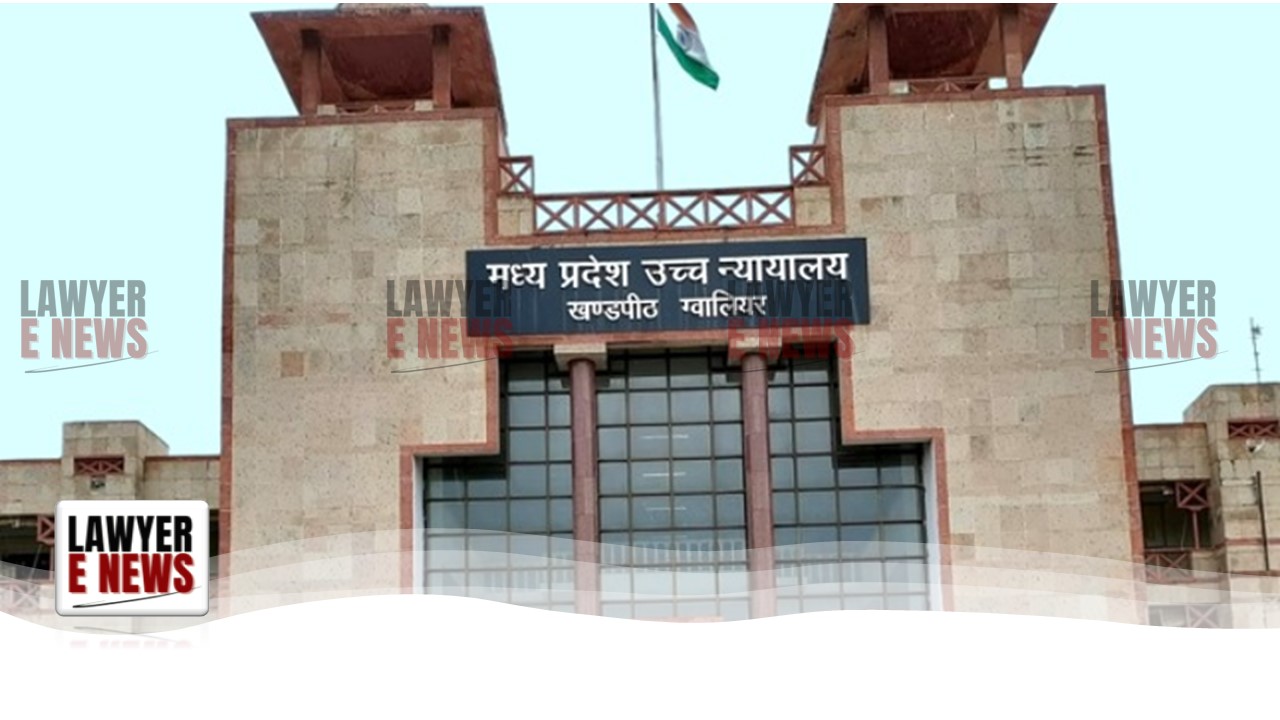-
by Admin
15 February 2026 2:36 AM



Madhya Pradesh High Court dismissed the writ petition, where the petitioner challenged the Collector’s suo motu exercise of powers under Section 50 of the Madhya Pradesh Land Revenue Code (MPLR Code), 1959. The High Court upheld the Collector's decision to initiate revision proceedings to cancel the mutation of government land and the issuance of a Nazul No-Objection Certificate (NOC) in favor of the petitioner.
The petitioner, Khursheed Ali, claimed possession of land measuring 19,595 sq. ft. (comprising Kh. Nos. 674 and 675) through an oral gift (Hiba) purportedly made by the Nawab of Obedulla to his father in 1934. The petitioner had rented the land to tenants, and following their eviction via a compromise decree obtained in a civil suit in 2010, he applied for mutation of the land in his favor. Subsequently, a Nazul NOC was issued to the petitioner in June 2010, based on recommendations from Naib Tahsildar Bajrang Bahadur Singh.
However, in August 2011, after complaints were raised about the land being government property, the Collector of Bhopal initiated suo motu revision proceedings under Section 50 of the MPLR Code to cancel the mutation and the Nazul NOC. The petitioner filed the writ petition challenging the revision proceedings, arguing that they were initiated beyond the permissible time and that the mutation and NOC were lawfully granted.
The petitioner argued that the suo motu revision was time-barred under the MPLR Code. However, the Court rejected this contention, noting that the revision was initiated within 180 days of receiving information about the irregularities.
"The suo motu exercise of power was within the permissible period from the date of receipt of information about the illegalities, and therefore, not barred by time," the Court observed [Para 55].
The Court held that the compromise decree obtained in the civil suit was unauthorized. Naib Tahsildar Bajrang Bahadur Singh, who represented the State in the compromise, lacked the necessary authority to enter into such an agreement. His actions led to the wrongful mutation of government land in favor of the petitioner.
"Bajrang Bahadur Singh acted in bad faith and without proper authority, resulting in an illegal transfer of government land," the Court emphasized [Para 30].
The Court noted that despite prior knowledge of the fraud, State authorities failed to take appropriate action, which contributed to the prolonged occupation of the disputed land by the petitioner.
The Court held Bajrang Bahadur Singh responsible for his unauthorized actions and directed him to pay mesne profits to the State at a rate of Rs. 10,000 per month from the date of the compromise decree until the actual payment is made. The Court also directed departmental action against several revenue officials involved in the case.
"Since Bajrang Bahadur Singh unauthorizedly gave away State land, he must compensate the State for depriving it of the land," the Court ruled [Para 58].
The Court refused to quash the compromise decree itself, as a separate case (MJC No. 177 of 2024) was pending before the trial court to set aside the decree. However, the Court made it clear that the compromise decree did not grant the petitioner any valid title over the land.
"The compromise decree did not declare the title of the petitioner, and the unauthorized compromise entered into by Bajrang Bahadur Singh cannot be treated as valid," the Court clarified [Paras 38-39].
The High Court dismissed the petition with a cost of Rs. 50,000 imposed on the petitioner for pursuing the case and staying proceedings for over 13 years. The Court emphasized the importance of safeguarding government land and directed the State to take stringent action against erring officials.
Mesne Profits: Bajrang Bahadur Singh was ordered to pay Rs. 10,000 per month as mesne profits from August 2010 until the payment is made.
Departmental Action: The Court ordered the Chief Secretary of Madhya Pradesh to ensure that disciplinary proceedings against the involved officials, including Bajrang Bahadur Singh, Sandeep Karketta, and Devendra Choudhary, are concluded within a specified timeframe.
Collector’s Decision: The Court directed the Collector, Bhopal, to finalize the revision proceedings within two months, with a specific order that the petitioner must appear before the Collector on October 25, 2024, failing which the Collector may proceed ex parte.
Costs: The petitioner was ordered to pay Rs. 50,000 in costs to the High Court within one month. Failure to comply would result in contempt proceedings and further recovery actions.
"The interim order dated 24-10-2011 is hereby vacated. The petition is dismissed with costs of Rs. 50,000, payable by the petitioner," the Court concluded [Para 62].
The Madhya Pradesh High Court's ruling in this case underscores the importance of proper authorization in land mutation and compromise proceedings. The Court reaffirmed that State officials must act within their authority to protect public land and directed strict accountability for those who facilitated the illegal transfer of government property.
Date of Decision: October 17, 2024
